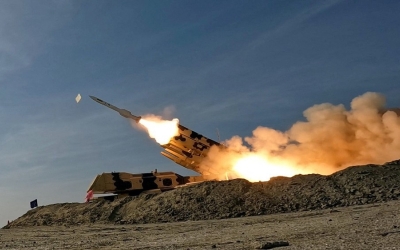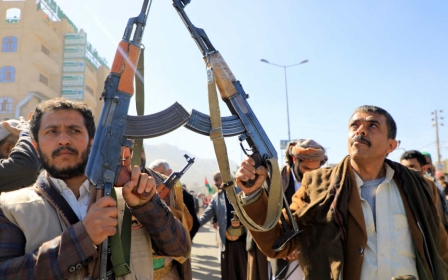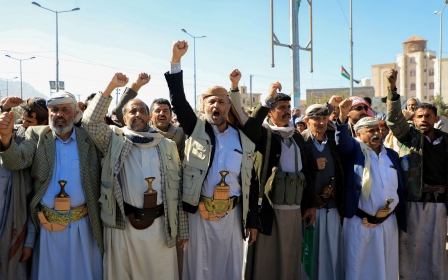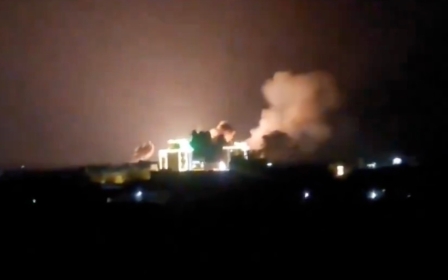Yemen: Houthis tit-for-tat 'terrorist' designation of the US and UK raises fears for crucial aid
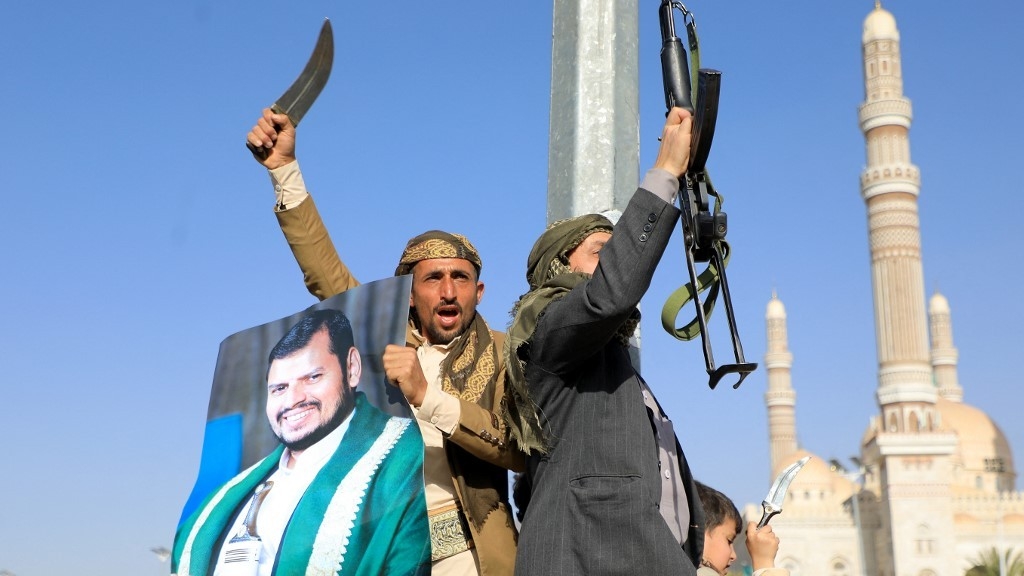
The reciprocal designation by Yemen's Houthis of the US and the UK as "terrorist states" is raising concerns about the potential adverse impact on humanitarian efforts.
More than 21 million people - two-thirds of the population - are in need of humanitarian assistance, and the US is a major donor of the humanitarian response plan in Yemen. It donated more than $738m and the UK donated more than $105m in 2023.
However, prior to its joint air strikes with the UK on Houthi targets in Yemen, the US in November redesignated the Houthis as a Global Terrorist Group, effective 30 days from 17 January 2024. The decision, according to the State Department, came as a result of Houthi attacks since November against international maritime vessels in the Red Sea and Gulf of Aden as well as military forces positioned in the area to defend the safety and security of commercial shipping.
The Houthis have not been deterred by the decision or the US-UK military attacks, and vowed to continue disrupting Red Sea traffic until Israel stops its assault on Gaza and allows humanitarian aid and basic supplies to enter the besieged enclave.
"Our country will continue its operations until food and medicine reach the people of Gaza," said Houthi leader Abdel-Malek al-Houthi on Thursday.
New MEE newsletter: Jerusalem Dispatch
Sign up to get the latest insights and analysis on Israel-Palestine, alongside Turkey Unpacked and other MEE newsletters
The group also designated the US and UK on 20 January as "terrorist states", and the Ministry of Foreign Affairs in Sanaa sent an official letter to the UN Resident Coordinator asking all US and UK citizens working with UN agencies and humanitarian organisations to leave the country within 30 days.
Some International Non-Governmental Organisations (INGOs) working in Yemen have warned that the designation of the Houthis will do more harm than good.
"The US designating the Houthis as a global terrorist group will almost certainly have devastating consequences for the Yemeni people, with this added uncertainty disrupting an already overburdened humanitarian response and struggling Yemeni economy," said Oxfam, a British-founded confederation of 21 independent charitable organisations focusing on the alleviation of global poverty.
Yemenis can't afford less aid
Washington said that during the 30-day implementation delay, the US administration will conduct robust outreach to stakeholders, aid providers, and partners who are crucial to facilitating humanitarian assistance and the commercial import of critical commodities in Yemen.
"Yemenis have been suffering for around nine years. We hope that the US, UK and other countries help them overcome their suffering, not to double it," a humanitarian worker with an INGO in Yemen told Middle East Eye on condition of anonymity.
"I heard that the US may implement some exceptions to humanitarian organisations to work in the Houthi-controlled areas, but that isn't enough," they said. "We also need them to donate more so we can reach more people in need."
The United Nations World Food Programme (WFP) announced in December the pause of General Food Distributions in areas under the control of the Houthis, driven by limited funding and the absence of an agreement with the authorities on a smaller programme that matches available resources to families most in need.
WFP said it aims to reduce the number of beneficiaries in the Houthi-controlled areas from 9.5 to 6.5, so three million families will no longer receive that food basket.
"The need has increased in Yemen after the pause of WFP, so the world must help with more funding," the aid worker added, further calling on the Houthis to allow humanitarian workers from all nationalities to work in Yemen.
"Aid workers came to help Yemenis. I hope that the Houthis will reconsider their decision related to the US and UK aid workers."
Food baskets 'disappeared'
Mohammed Gabr, who has been displaced from Hodeidah to Dhamar district, used to receive food baskets from the WFP. But he confirmed to MEE that the last time he received such aid was four months ago. Since then, he has been struggling to provide for his family.
"The food basket reduced our suffering, but unfortunately it has disappeared," he told MEE. "When we asked, they told us they don't have enough funding."
"I don't know what they mean by funding and not sure from where they get it, but the truth is that we don't have enough food at our homes now."
Gabr, in his 60s and currently unemployed, said he is providing for seven family members, fully relying on NGO aid and local charitable support.
'In these difficult times, I hope the assistance we receive will be expanded and diversified'
- Mohammed Gabr, displaced Yemeni
Aware of the ongoing tensions between Yemen and the US in the Red Sea, Gabr said he aligns himself with the Houthis, supporting their stance against Israel and its allies.
"I stand with Ansar Allah [the Houthi movement] against Israel, and I believe the aid we receive should not be tied to our position against the Zionists. In these difficult times, I hope the assistance we receive will be expanded and diversified."
Another Houthi supporter, who spoke anonymously due to a lack of authorisation to engage with the media, said he believes that the US will exert pressure on Yemenis to divert their attention from the Palestine issue.
"As a country supporting Palestine, we expect accusations of terrorism and sanctions from the US, acting as the hand of the Zionists," he told MEE. "We dismiss the US statements, considering it our enemy, which has already initiated attacks on Yemen."
Addressing the presence of US and UK humanitarian workers in Yemen, he said foreigners from various nations continue to work in Yemen, but noted that the authorities have not requested their departure since their countries did not launch attacks on Yemen.
"We welcome any country willing to aid Yemen in humanitarian efforts, but we won't accept aid that compromises our stance or abandons Gaza."
Yemen has been riven by civil war and a Saudi-led bombing campaign since 2015, and a range of different opposing factions control different territories across the country.
The attacks by the US and UK have provoked anger across Yemen and have even been condemned by opponents of the Houthi.
However, the internationally recognised government of Yemen has publicly condemned the Houthi attacks in the Red Sea and accused them of dragging the country into chaos by provoking the UK and US's retaliatory strikes.
Middle East Eye delivers independent and unrivalled coverage and analysis of the Middle East, North Africa and beyond. To learn more about republishing this content and the associated fees, please fill out this form. More about MEE can be found here.


